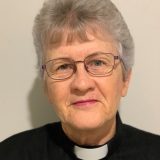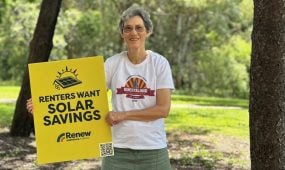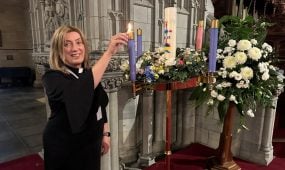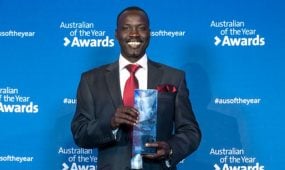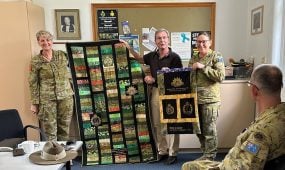Q&A with retiring Pastoral Care Coordinator, The Rev’d Ann Shepperson
Spotlight Q&A
Meet retiring Pastoral Care Coordinator for the Northern Region, The Rev’d Ann Shepperson, and find out about her ministry, favourite scriptures, travels, which person of faith inspires her most and her future plans
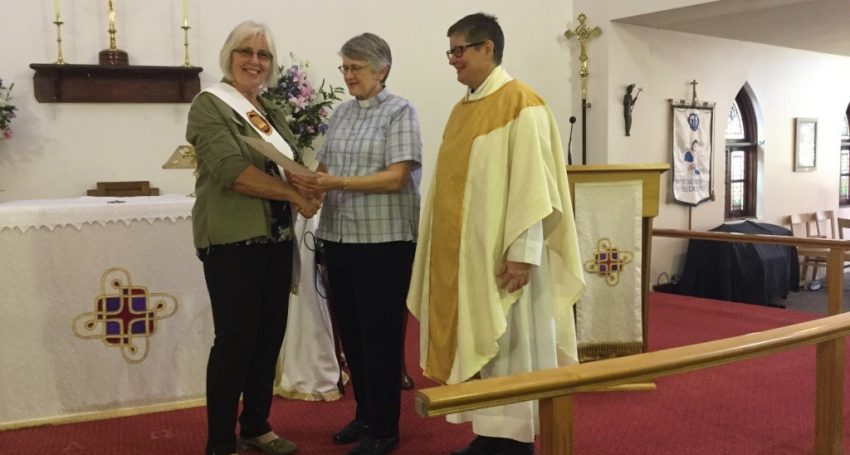
The Rev’d Ann Shepperson is Pastoral Care Coordinator of the Northern Region for the Anglican Church Southern Queensland. She provides Anglican ministry in the Sunshine Coast University Hospital, and has a particular interest in training Pastoral Carers to minister in our hospitals and prisons and equipping parishes to be open, hospitable and caring church communities. She is soon to retire after spending 13 years in ordained ministry.
How long have you been involved in the Anglican Church?
I was raised an Anglican and was involved in Sunday School teaching in Palmwoods Parish as a teenager and later in Bible studies and prayer groups and was a Liturgical Assistant in Cooroora Parish. Later, I sensed a call to ordination as a priest and began the journey through discernment and formation to ordination in 2006. Part of my calling was to pastoral care ministry and I served as a lay pastoral carer before ordination.
What is the name of your current role and what does your role involve?
My current role is Anglican Pastoral Care Coordinator for the Northern Region of our Diocese, serving as the Anglican Hospital Chaplain in the Sunshine Coast University Hospital (SCUH). As a member of the Hospital Chaplaincy Steering Committee, I have been involved in encouraging parishioners to become hospital Pastoral Carers, training some for Maryborough, Nambour, Caloundra, SCUH and SCUPH (private) hospitals. I have worked with other committee members to develop training courses for parishes to enhance caring and community building.
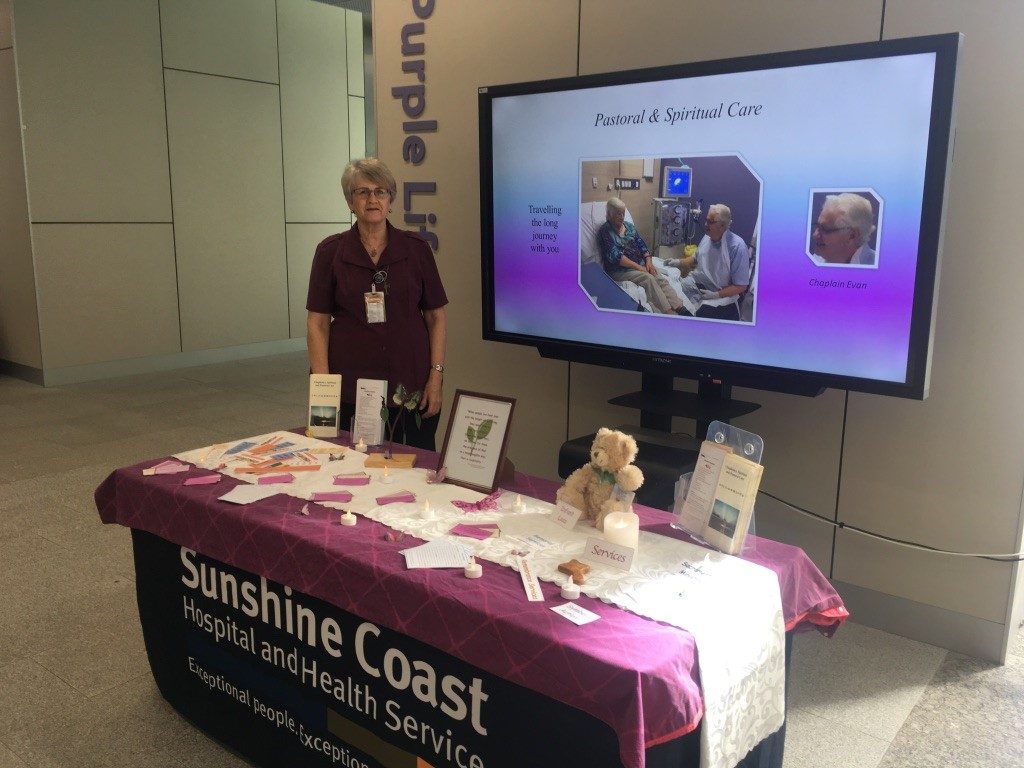
The Rev’d Ann Shepperson attending to the Pastoral Care Week Display table at Sunshine Coast University Hospital
How has your work as a Chaplain contributed to the mission of the Church?
The third mark of Mission of our church is “To respond to human need by loving service.” Each day, Pastoral Carers visit Anglicans, as well as people of other faiths or of no faith, many of who are vulnerable and broken by life’s unpredictable and unwanted events. As a Chaplain, I offer these people a safe space to explore their situation and to seek their own answers to questions of meaning and purpose that confront them at times of crisis. It is a privilege to recognise Christ in these people and to seek to be Christ to them in their suffering. One of the most rewarding experiences for me has been supporting an Anglican woman with motor neuron disease and her family through the trauma of her decision to remove life support. I was able to provide Holy Communion and to anoint her, as well as remain with the family during the withdrawal of life support and then accompany her body to the mortuary. Having provided support during her life, the care cycle was completed by being with her family and then remaining with her body to the end of her hospital journey.
Advertisement
What have been the highlights of your role so far?
I think the greatest privilege of being a Hospital Chaplain is to receive the confidence of patients as they share their story. Sometimes this is a time to rejoice, while at other times, it means supporting patients and their families as they move towards death. A second highlight has been to help develop the Pastorally Caring in Your Community Course (PCiYC) to equip our parishioners and grow communities that are open, hospitable and supportive so they are a place where others feel safe, welcome and included. Hearing parishioners, after completing the course, report how they have been able to approach a stranger using the skills learned and then finding that they could emotionally support that person in a difficult situation has been such an affirmation of the course.
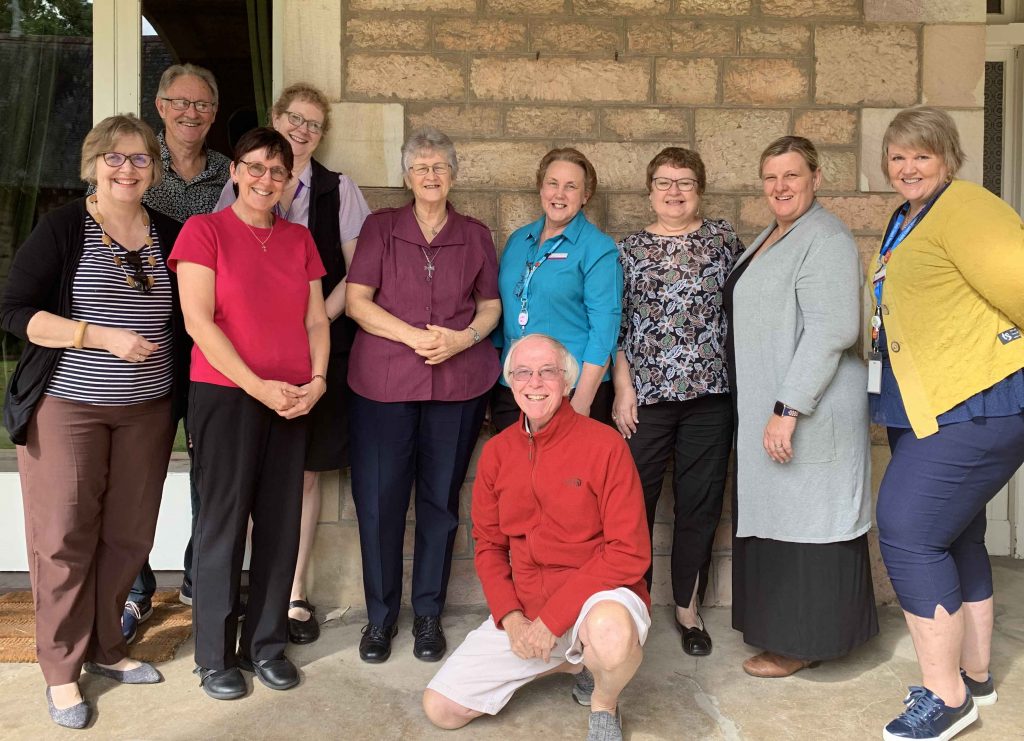
(L-R): Joanne McDiarmid, Ian Hamilton, Carol O’Ryan, Judy Burt, Ann Shepperson, Sid Rogers, Cheryl Selvage, Sally Isles, Jodie O’Shannassy and Michelle Philp at The Rev’d Ann’s retirement morning tea at St Francis College in May 2019
What are your plans and goals for the next few years?
I will continue to be involved in training ordinands and Prison Chaplains and also continue to promote and present the PCiYC course in parishes. I have a few ideas that I will explore further after retiring. Domestic violence awareness may also be an area for the future as I believe it is important for young women and men to learn about healthy boundaries and also to grow in self-worth – a worth that reflects to some degree the value that God places on them.
Advertisement
Why is it important for us as Christians to serve the broader community?
As Christians, we are followers of Jesus, whose ministry was among some of the most vulnerable and broken people of his time. Ministry within the church is vital to build up the body of Christ; however, this building up is an equipping for each of us to reach out into our spheres of influence and involvement to be Christ to those who are in need of comfort, support and reassurance.
Can you tell us a little about your faith journey?
I was born into a worshipping Anglican family; however, it wasn’t until I was in my 30s that I found a personal faith through the Charismatic Renewal. I attended Anglican Renewal Movement conferences and was involved in Aglow women’s ministry; though it was a Cursillo weekend in 1996 that cemented my position in the Anglican Church and drew me towards ordination.
What is your favourite scripture and why?
Psalm 139 is my favourite Scripture as it speaks of the deep love for us and the intimate knowledge of each one of us that God has. John 1.1-18 is a close second, possibly because we learned it for confirmation classes and it encapsulates God’s gracious reaching out to us.
What person of faith inspires you the most and why?
I have deep admiration for Mother Teresa who ‘walked the walk’ of faith, expressing Christ’s compassion to the most vulnerable in India. She seemed to me to epitomise the injunction in the epistle of James to show faith by our works.
What are the primary strengths of the church and what is the best way to make the most of these for the benefit of our communities?
Our diversity of theologies is one of our greatest strengths, enabling people from a variety of stances to meet and share. I believe being respectful and accepting of those differing stances and willing to hear the opinion of ‘the other’ offer potential for growth in faith and compassion for each of us. It is also an excellent starting point for us to accept others with different opinions without judgement or criticism.
What are the challenges currently faced by the Church and what can be done to overcome these?
One of the greatest challenges facing the church seems to me to be the number of people in our community, young and old, who don’t have any concept of themselves as people of value who are worthy of respect. As Christians, we have a valuable gift for these people – a gift of loving acceptance and esteem that has the potential to turn lives from despair to the hope that Jesus has given us.
What do you do in your free time to recharge and relax?
I enjoy travel, reading and movies and love to spend time with family and friends. While I love mixing with people, I also need to recharge my batteries in solitude.
If you could have a billboard with any text on it, what would it say and why?
“Love your neighbour as yourself” seems to me to speak into the need for people to be more aware of their intrinsic value as human beings. We need to love God and to love others, but to truly do that we need to reach a place of loving acceptance of ourselves as people of value.
Where have you travelled to?
My travels have taken me to the USA, Norfolk Island, New Zealand and parts of all states of Australia except South Australia – and it’s on my list. Last year, I was blessed during my long service leave to travel to Europe, visiting several countries, spending seven weeks in the UK and touring the Holy Lands as I returned to Australia. Scotland and France are places I’d like to re-visit.
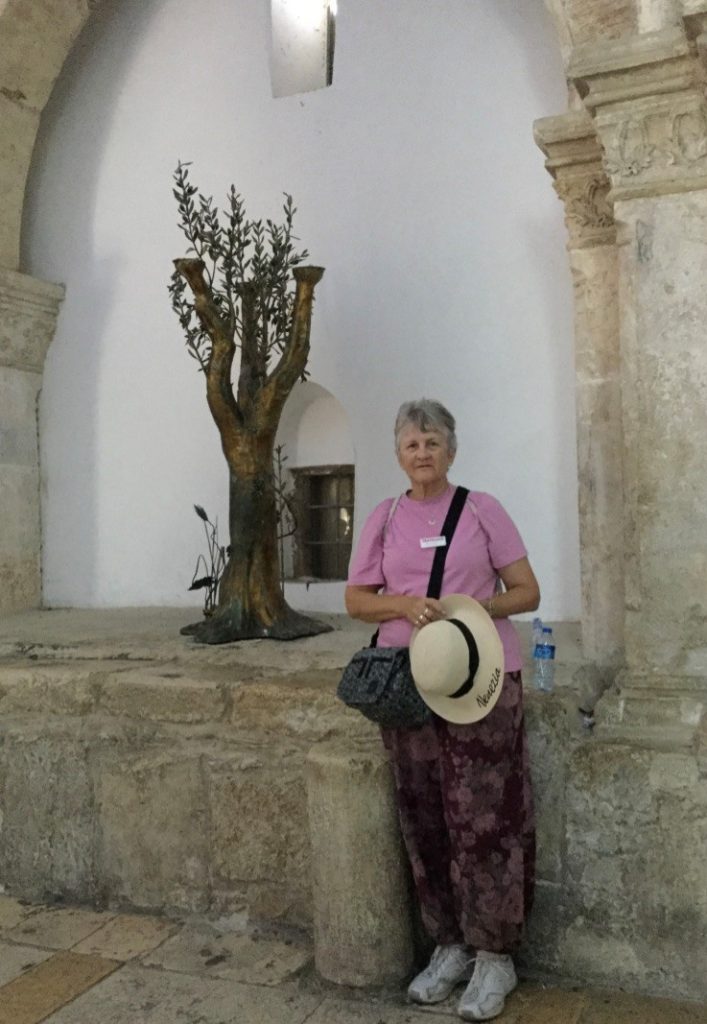
The Rev’d Ann in the room where the Last Supper is said to have been celebrated, Jerusalem

